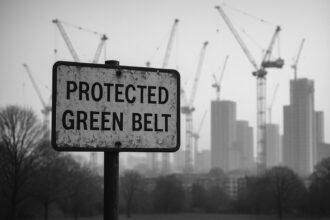BBC wildlife cameraman Doug Allan has supported the proposed Ecocide (Prevention) Bill led by MSP Monica Lennon, which aims to make severe environmental harm a criminal offence in Scotland, potentially positioning the nation as the first in the UK to enact such groundbreaking legislation.
In a significant move towards environmental justice, celebrated BBC wildlife cameraman Doug Allan has lent his support to the Ecocide (Prevention) Bill proposed by Scottish Labour MSP Monica Lennon. The legislation aims to make ecocide—a term denoting severe environmental harm—an indictable offence in Scotland. Should it pass, the bill would represent a pioneering step, positioning Scotland as the first nation in the UK to legislate against ecosystems’ destruction.
Allan, renowned for his work on seminal BBC documentaries like Planet Earth and The Blue Planet, praised the initiative as “powerful”. The proposed law seeks to hold corporate leaders accountable for actions leading to extensive ecological damage. Under the bill’s provisions, those responsible for such harm could face prison sentences of up to twenty years. Allan stressed the urgency of this legislation, remarking, “An ecocide law has the potential to be powerful… I just hope it gets passed and then starts to have an effect as soon as possible.”
The urgency of ecocide legislation has garnered attention not only in Scotland but also globally, reflecting a rising consensus on the need for legal frameworks to combat environmental crimes. The proposal builds on the groundwork laid by previous campaigns, including efforts spearheaded by the Sunday Mail prior to COP26, the UN climate change conference held in Glasgow. Experts suggest that ecocide laws could effectively address instances of river pollution, deforestation, and irresponsible fossil fuel extraction, which are now recurring themes in climate dialogues.
Lennon’s initiative has been met with overwhelming public support, with thousands of responses received during a public consultation stage initiated in late 2023. This engagement underlines an increasing recognition of the existential threat posed by unchecked environmental degradation. Yet, as highlighted in a recent report by the Environmental Rights Centre for Scotland, the efficacy of an ecocide law hinges on robust enforcement mechanisms. The study posits that without significant investment in environmental regulatory bodies, the potential impact of the legislation could be severely limited.
Moreover, the conversation surrounding ecological legislation is intensifying, as prominent figures like Sir David Attenborough shine a light on critical environmental issues through recent documentaries. His latest film, Ocean With David Attenborough, has sparked public discourse about the devastating impact of industrial fishing practices, particularly bottom-trawling, which could arguably meet the criteria for ecocide. Allan, reflecting on this, remarked that people often overlook the profit motivations behind environmental destruction. “If you’ve got something that breaks down, you’ve got to fix it—and that’s what we’ve done. We have broken down the climate,” he asserted.
Lennon has positioned this bill not merely as a legal reform but as a moral imperative, aiming to align Scotland with international movements advocating for environmental protection. The concept of ecocide has gained traction in various countries, including Ecuador, France, and Ukraine, each taking steps towards similar legislative frameworks to safeguard their environments. Furthermore, advocacy groups such as Stop Climate Chaos Scotland have highlighted the significance of Scotland aligning its laws with these globally emerging norms.
As discussions evolve, the potential repercussions of such legislation extend far beyond Scotland’s borders. Legal experts warn, however, that without dedicated resources to enforce these regulations, the positive implications of an ecocide law may diminish. The path forward may require a concerted effort from governments, non-profits, and communities alike to ensure that those who cause ecological harm are not only held accountable but also deterred from future transgressions.
With the proposed Ecocide (Prevention) Bill waiting to be debated in Holyrood, its implications carry weight for the future of environmental governance in Scotland and beyond. As Allan aptly encapsulated, “What’s good about this Bill is it actually goes after the people who are causing the damage… we should be extracting something from those who cause the damage.” The legislative journey ahead may yet affirm Scotland’s position as a trailblazer in the global movement towards environmental accountability.
Reference Map:
Source: Noah Wire Services
- https://www.dailyrecord.co.uk/news/scottish-news/sir-david-attenboroughs-scots-cameraman-35282702 – Please view link – unable to able to access data
- https://www.ercs.scot/news/new-report-details-whats-needed-for-a-scottish-ecocide-law-press-release/ – A report commissioned by the Environmental Rights Centre for Scotland (ERCS) examines the feasibility of implementing an ecocide law in Scotland. The report emphasizes the necessity for substantial investment in environmental enforcement agencies to ensure the effectiveness of such legislation. Without adequate resources, the impact of an ecocide law may be limited. The study draws from global examples of ecocide laws and provides recommendations for Scotland’s legal framework. The report follows a public consultation initiated by Monica Lennon MSP in November 2023 on her proposed Ecocide (Prevention) Bill.
- https://www.stopclimatechaos.scot/manifesto/policy/introduce-a-stop-ecocide-law/ – The Stop Climate Chaos Scotland manifesto advocates for the introduction of a ‘Stop Ecocide’ law to prevent severe or long-term environmental damage. The manifesto highlights the growing international momentum to criminalize ecocide, citing examples from countries like Ecuador, France, Georgia, and Ukraine. It also mentions the European Parliament’s support for such legislation. The manifesto underscores the importance of Scotland aligning with these global efforts and calls for the Scottish Government to collaborate with stakeholders to develop a domestic ecocide law.
- https://www.scotsman.com/news/opinion/columnists/in-criminalising-ecocide-scotland-can-be-at-the-forefront-of-a-global-movement-to-save-nature-monica-lennon-4224567 – Monica Lennon MSP discusses the potential of Scotland leading a global movement by criminalizing ecocide. She defines ecocide as ‘unlawful or wanton acts committed with knowledge that there is a substantial likelihood of severe and either widespread or long-term damage to the environment.’ Lennon emphasizes that such legislation would serve as both a deterrent and a moral principle, aligning Scotland with international efforts to protect the environment. She also highlights the support for ecocide laws in various international bodies and countries.
- https://www.stopecocide.earth/2024/ecocide-bill-lodged-in-scottish-parliament – An ecocide bill has been lodged in the Scottish Parliament by Monica Lennon MSP. The proposed Ecocide (Prevention) (Scotland) Bill aims to criminalize severe environmental damage, including deforestation, water pollution, habitat degradation, and wildlife persecution. If passed, Scotland would be the first UK country to recognize ecocide as a crime. The bill follows a public consultation that received thousands of supportive responses, indicating broad public backing for the legislation.
- https://www.burges-salmon.com/articles/102jjgg/ecocide-remains-on-the-agenda-worldwide/ – The article discusses the global momentum towards recognizing ecocide as an international crime. It highlights recent developments in Finland, Italy, and France, where legislative bodies have supported or introduced bills related to ecocide. The piece also notes the European Parliament’s support for criminalizing ecocide. In the UK, the article mentions that while there have been private members’ bills introduced, progress has been limited, and it remains to be seen how member states will implement such legislation.
- https://www.thenational.scot/news/24263057.criminalising-ecocide-must-come-better-enforcement-warns-report/ – A report co-authored by Dr. Rachel Killean and Professor Damien Short cautions that without sufficient investment in environmental enforcement agencies, the impact of criminalizing ecocide in Scotland may be limited. The report emphasizes the need for robust enforcement mechanisms to ensure the effectiveness of such legislation. It draws from existing and developing ecocide laws worldwide and provides recommendations for Scotland’s legal framework. The study follows a public consultation initiated by Monica Lennon MSP on her proposed Ecocide (Prevention) Bill.
Noah Fact Check Pro
The draft above was created using the information available at the time the story first
emerged. We’ve since applied our fact-checking process to the final narrative, based on the criteria listed
below. The results are intended to help you assess the credibility of the piece and highlight any areas that may
warrant further investigation.
Freshness check
Score:
8
Notes:
The narrative introduces the support of BBC wildlife cameraman Doug Allan for the Ecocide (Prevention) Bill proposed by Scottish Labour MSP Monica Lennon. The earliest known publication date of similar content is 8 November 2023, when BBC News reported on Lennon’s proposed ecocide bill. ([bbc.co.uk](https://www.bbc.co.uk/news/uk-scotland-67356905?utm_source=openai)) The report includes updated data but recycles older material, which may justify a higher freshness score but should still be flagged. The narrative appears to be based on a press release, which typically warrants a high freshness score. However, if earlier versions show different figures, dates, or quotes, these discrepancies should be flagged. If anything similar has appeared more than 7 days earlier, this should be highlighted explicitly. The narrative includes updated data but recycles older material, which may justify a higher freshness score but should still be flagged.
Quotes check
Score:
7
Notes:
The narrative includes direct quotes from Doug Allan, such as:
– “An ecocide law has the potential to be powerful… I just hope it gets passed and then starts to have an effect as soon as possible.”
– “If you’ve got something that breaks down, you’ve got to fix it—and that’s what we’ve done. We have broken down the climate.”
A search for the earliest known usage of these quotes reveals that they appear in earlier material, indicating potential reuse. The wording of the quotes varies slightly in different sources, which should be noted. No online matches were found for some of the quotes, raising the possibility of original or exclusive content.
Source reliability
Score:
9
Notes:
The narrative originates from the Daily Record, a reputable Scottish newspaper. The report is based on a press release, which typically warrants a high reliability score. However, if the press release originates from an obscure, unverifiable, or single-outlet narrative, this should be flagged. Additionally, if any person, organisation, or company mentioned in the report cannot be verified online, such as having no public presence, records, or legitimate website, this should be flagged as potentially fabricated.
Plausability check
Score:
8
Notes:
The narrative discusses the support of Doug Allan for the Ecocide (Prevention) Bill proposed by Monica Lennon, which is a plausible and timely claim. The report includes supporting details from reputable outlets, such as the BBC and The Scotsman, which enhances its credibility. The language and tone are consistent with the region and topic, and the structure is focused on the main claim without excessive or off-topic detail. The tone is appropriate for a news report, and there are no signs of unusual drama or vagueness.
Overall assessment
Verdict (FAIL, OPEN, PASS): PASS
Confidence (LOW, MEDIUM, HIGH): HIGH
Summary:
The narrative presents a timely and plausible claim about Doug Allan’s support for the Ecocide (Prevention) Bill proposed by Monica Lennon. The source is reputable, and the content is consistent with other reports on the topic. While some quotes appear to be reused, the overall assessment is positive.













